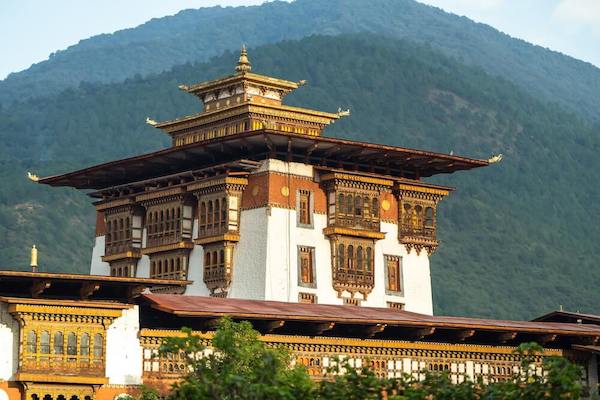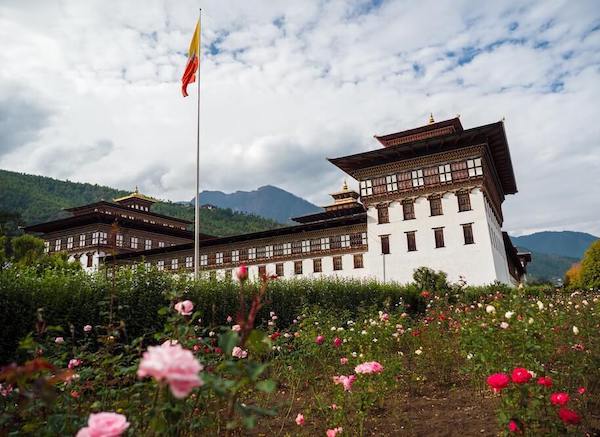
Until the beginning of the twentieth century, Bhutan was ruled by a theocratic political system established by Zhabdrung Ngawang Namgyal. Supreme religious and political authority resided with Zhabdrung Rinpoche, whose successor or 'Trulku', was chosen by reincarnation. The Druk Desi (Deb) used to be the country’s civil leader. Penlops (Governors) and Dzongpons (District Chiefs) administered the different regions under authority delegated them by the central authority.
On December 17, 1907, the civil and monastic representatives unanimously crowned Sir Ugyen Wangchuck as the first hereditary monarch of Bhutan.
In 1926, Jigme Wangchuck succeeded Ugyen Wangchuck. The Third Druk Gyalpo Jigme Dorji Wangchuck began a campaign of modernisation and expansion of Bhutan’s government and society based on the accomplishments of his two predecessors. The National Assembly consisting of representatives of the people while the Monastic order and civil administration was established in 1953.
Fourth Druk Gyalpo Jigme Singye Wangchuk became the King in 1972. There has been steady decentralization of decision-making and institute building since then. His Majesty’s philosophy of Gross National Happiness guided Bhutan into the 21st century. The most momentous change in the structure of the government came in 1998 after the devolution of the executive power by His Majesty the King to the Council of Ministers. The Fourth Druk Gyalpo initiated the drafting of Bhutan’s first Constitution in 2001 and was eventually enacted in 2008.
Fifth Druk Gyalpo His Majesty King Jigme Khesar Namgyel Wangchuck acceded to the throne on December 14, 2006, and was crowned on November 6, 2008.
The head of government is the Prime Minister, who is elected from the ruling political party.
Administrative System
The administrative system of the country consists of the Central Government and Local Government. The Central Government comprises of Ministries, Departments and Autonomous bodies. The Local Government comprises of Dzongkhag Tshogdu, Gewog Tshogde and the Dzongkhag Thromde Tshogde. In order to plan and review the development activities most efficiently in the dzongkhags (districts), the Dzongkhag Tshogdu was established in 1981. The Dzongkhag Tshogdu compromises of elected representatives of the people with its chairman elected among the Gups. Similarly, the Gewog Tshogde was established in 1991 to further decentralize the decision-making process. The Gewog (village blocks) Tshogde comprises of Gup, Mangmi and Tshogpas. The main role of the Gewog Tshogde is to plan, prioritise and implement the developmental activities in their respective Gewogs.
 National Assembly
National Assembly
The National Assembly (Gyalyong Tshogdu) consists of 47 members who are elected representatives from the 47 Constituencies. The main functions of the National Assembly are to enact, amend or repeal laws and approve the national budget. The National Assembly also reviews and approves the Five-Year Plans, which are formulated by the government in consultation with the people of every dzongkhag (district). It also deliberates on issues that affect the security and well-being of the country and promotes the welfare and happiness of the people. The National Assembly meets twice a year. However, if an important and emergency matter demands, the Speaker may convene special sessions of the National Assembly. The duration of the National Assembly session is governed by the nature and scope of the points for discussion received from the people. A session normally lasts about three weeks. The Speaker is the presiding officer of the House and is assisted by a Deputy Speaker. The day-to-day administration of the National Assembly rests with the secretariat which is headed by a secretary.
National Council
The National Council was established in 2008 under Article 11 of the Constitution of Bhutan. There are 25 members; 20 are elected by the people from 20 dzongkhags (districts) and 5 are nominated by His Majesty, The King. Their tenure is for five years which commences from the date of the first sitting. The main functions of the National Council are to: ensure that the government safeguards the interest of the nation and fulfils the aspirations of the people through public review of policies and issues, bills and other legislation, and scrutiny of state functions; act as the house of review on matters affecting the security and sovereignty of the country and the interests of the nation and people that need to be brought to the notice of His Majesty The King, Prime Minister, and the National Assembly. The National Council meets twice a year. However, special sessions may also be convened depending upon the needs. The chairperson, who is elected from 25 members of the National Council, is the presiding officer of the House and is assisted by a deputy chairperson. The National Council has seven working committees: House Committee, Legislative Committee, Economic Affairs Committee, Social & Cultural Affairs Committee, Natural Resources and Environment Committee, Good Governance Committee, and Foreign Relation Committee.
Monastic Body
The Monastic Body comprises the Central Monastic Body and the Rabdeys (District Monastic Body). The Central Monastic Body receives annual subsidy from the government to manage and run its day-to-day affairs. The Monastic Body is the sole arbiter on religious matters. The Je Khenpo is the head of the monastic body and is responsible for the nation’s religious affairs. He is chosen from among high-ranking monks. Apart from being thoroughly versed in all branches of religious scholarship and practice, the candidate must also have undergone prolonged mediation. The present Je Khenpo Trulku Jigme Chhoeda is the 70th Je Khenpo.